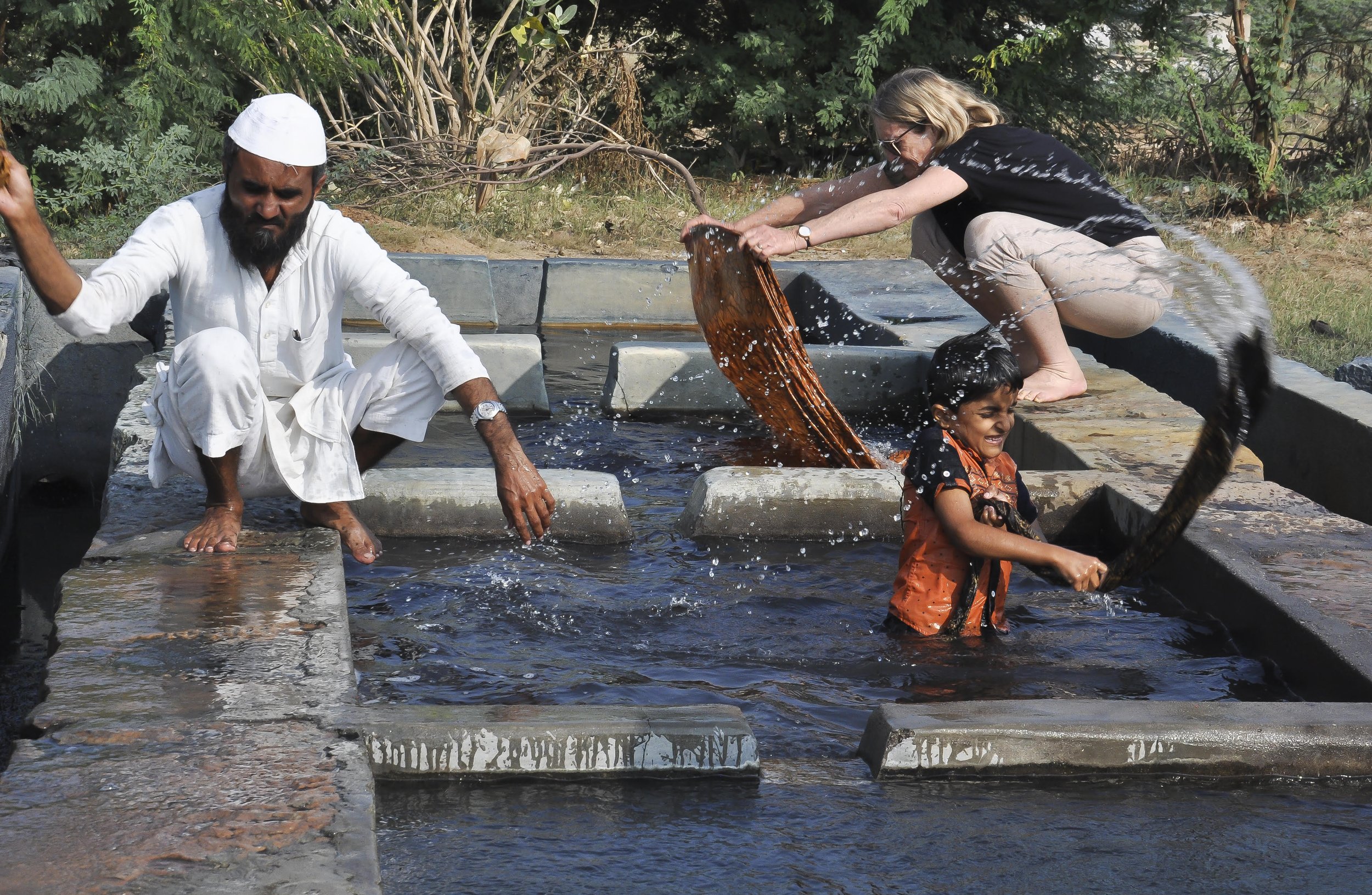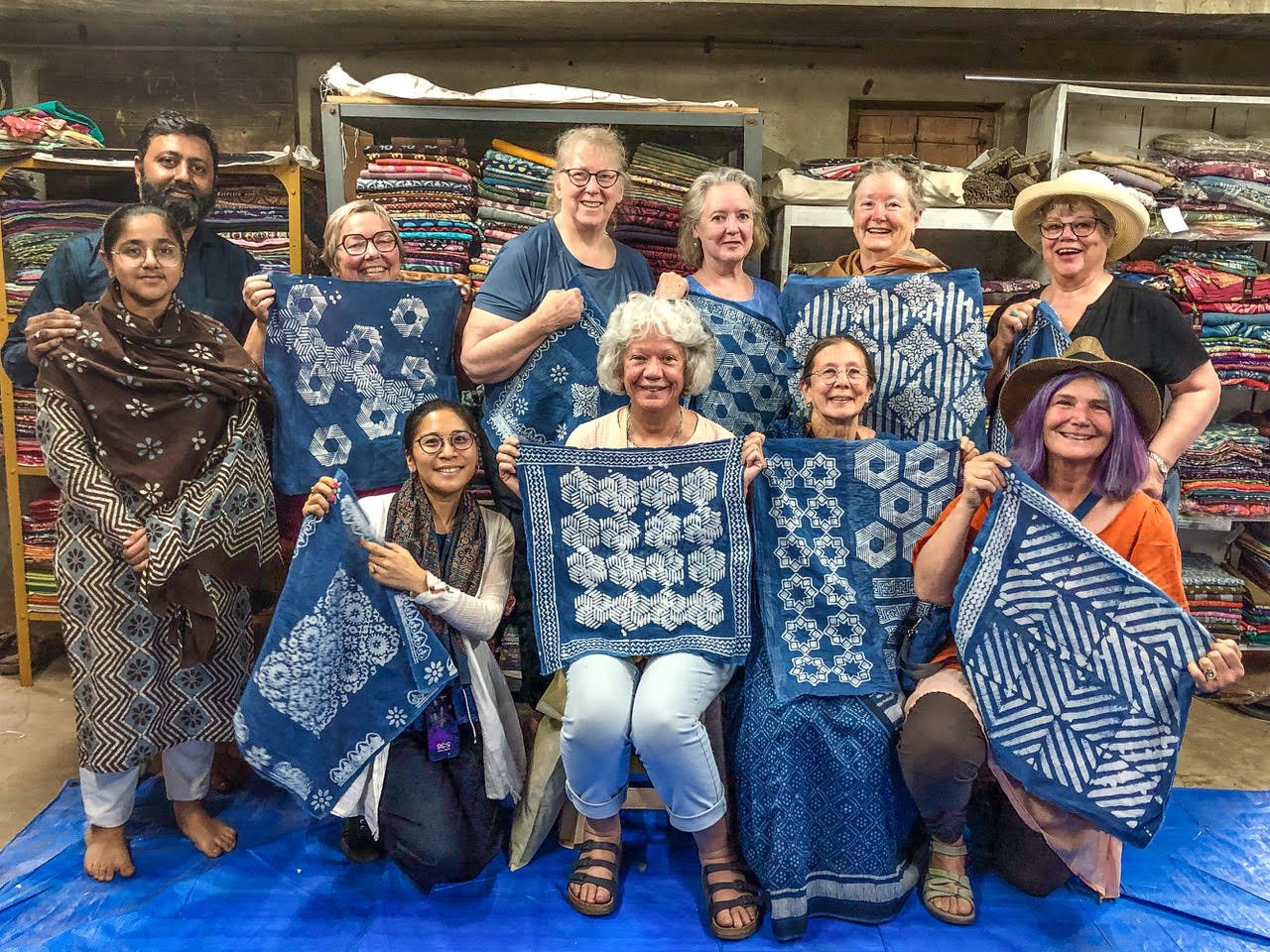Building sustainability through human connections - from block printed textiles in Kutch
Khalidbhai paints a natural iron acetate dye background on a printed textile. Ajrakhpur 2019. Photo by Judy Frater.
The book The Art of the Dyer in Kutch - Traditional Block Printed Textiles: Culture and Technique was written by Judy Frater with Ismail Khatri and Latha Tummuru and was published by Kindle Direct Publishing in October 2021. It details the rich textile printing and dyeing tradition practiced by the Khatri community of Kutch. Judy, former Curator at The Textile Museum, resident of Kutch for 30 years, and founder of Somaiya Kala Vidya, the first design school for artisans, consolidates this treasure of knowledge into a reference for artisans, designers and connoisseurs. Equally important in a world concerned with sustainability, the book provides a focus on the human connections of the tradition. Judy shares her view.
The research for this book was done in 1994. We owe the impetus to Ritu Kumar, who wanted to know what prints were traditional in Kutch. It turned out to be a big project. Master artisan Ismailbhai Khatri patiently worked with me for months, divining those old gems from the huge jumble of wooden blocks, making impressions, replicating lost textiles and, most importantly, explaining to Latha as well as me as much as he could from the infinite depths of his cultural heritage. The text was drafted soon after that, before the earthquake of 2001 made drastic changes in the social as well as physical environment of Kutch.
The Art of the Dyer in Kutch - Traditional Block Printed Textiles: Culture and Technique by Judy Frater with Ismail Khatri and Latha Tummuru
Irfanbhai and his son Arkambhai teach fine points of block printing to Sharon and Jan in a tour workshop. Ajrakhpur 2024. Photo by Judy Frater.
Today, hand block printed fabric is produced in thousands of meters, racing to keep pace with the industrial production that forced it to seek markets beyond the traditional consumers. Many of the textiles documented in this book are all but forgotten. I decided to make the documentation available so that the next generation of Khatri artisans (dyers) can draw from their rich traditions.
In a world now concerned with sustainability, what is equally important in this document is a model for genuine sustainability. Sustainable fashion in my opinion is an oxymoron: it cannot exist. Fashion by nature changes and the fashion industry by nature wants us to keep consuming so that it is sustained.
Striking in the traditional system of hand printed, naturally dyed textiles of Kutch is that highly sophisticated, technically complex, and exquisitely beautiful textiles were created for simple, poor pastoralists and agriculturists. They had only one or two of each textile - one to wear while the other was being washed. But they were of what today would be understood as museum quality - and should be considered as luxury items. The quality was always as good as possible because the maker and consumer knew each other intimately, and both equally understood and appreciated the quality of fabric, printing and dyeing. There was satisfaction in making and consuming and no thought to cut corners in quality.
Village people knew precisely how to buy less and buy better. Their textiles were made to last a long time and were never thought of as expensive. They were worth the price, and that was exchanged in barter. When I asked Irfanbhai Khatri how they ensured that the exchange of textiles and milk, goats or grains was equal, he answered simply, “We didn’t.” Everyone got what he needed.
Irfanbhai and Arkambhai instruct in final washing with a workshop participant. Ajrakhpur 2019.
We probably can’t go back to a barter system now. But can we learn from the system in which makers and consumers share an understanding of quality? Can we think of buying less and buying better? Can we consider personal expression of style rather than commercially dictated fashion? And can we imagine cherishing and purchasing from an artisan so that, in the words of weaver Vishramji Valji, “As it slowly wears away you remember the person who made it”?
All this requires a focus on the human connection that was the basis of the traditional system.
Upcoming tour: An Unforgettable Textile Experience
5-18 January 2025, includes 4 day-long workshops and more
Celebrating craft traditions and her forthcoming book, Artisans by Design, Judy Frater is taking a small group to Kutch to meet the artisans profiled and explore hand-crafted textiles from the eyes of the artisans who create them. She will bring you into the lives of traditional artisans today. Meet artisan design graduates, hear their amazing stories, enjoy their exquisite innovations, and learn incredible techniques. Be prepared to ponder concepts of sustainability. Contact Judy Frater at judyf@textileslive.com
Shakilbhai and his daughter Safea after a batik with natural indigo dye workshop in Judy’s 2024 tour. Mundra, 2024. Photo by Adil Khatri.





